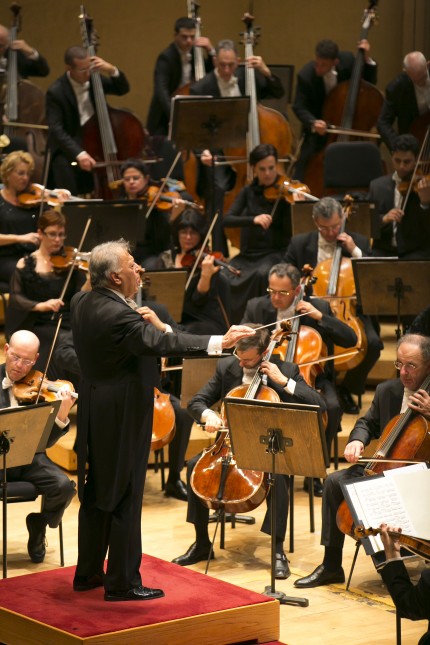Israel Philharmonic reaches the summit with affirmative Bruckner

Zubin Mehta led the Israel Philharmonic Orchestra in Bruckner’s Symphony No. 8 Sunday night at the Arsht Center in Miami. [Photo of Chicago performance by Todd Rosenberg]
Zubin Mehta, the orchestra’s music director since 1969, strode onto the stage at the Miami hall and kept the orchestra standing for a robust performance of the Star-Spangled Banner, a courtesy performed by few foreign orchestras. That was followed by the darker, more turbulent Israeli national anthem Hatikvah, with many members of the audience singing along with both.
Bruckner’s Symphony No. 8 was the sole work on the program, one of the longest symphonies in the repertoire, with a running time of more than 80 minutes. In programming this symphony, the Israel Philharmonic deserves credit for reintroducing Bruckner to a town that hasn’t seen a performance of one of his symphonies since the New World Symphony played the Seventh in 2006.
The orchestra, founded in 1936 from a core group of Jewish refugees from classical music’s Central European heartland, has the requisite rootedness, weight and power for this music. Strings and brass in particular brought off the work’s complex harmonies with both richness and clarity, for a plush tone that rarely became thick enough to fog over inner voices.
The first movement was less compelling than what was to come. Conducting without a score, Mehta led a performance that lacked as much of a sense of struggle and turmoil in a movement that Bruckner himself said contained the announcement of impending death. The solos in wind instruments had a matter-of-fact tone, without enough individuality to draw out the contrast with the roiling passages for full orchestra that surrounded them. Climaxes, such as the bone-chilling dissonant chords at the end of the movement, needed more than volume to bring them off.
Mehta took the Scherzo at a brisk pace, with a nimbleness and transparency you don’t often hear in the usual heavy, Germanic performances of Bruckner, giving the movement an extra jolt of energy.
The long melodies of the Adagio, the longest movement of the symphony, came off with a natural sense of flow and pacing, with a searching quality that captured the spirit of the movement. The ensemble’s strings gave a tremendous account of passages in which cellos and violas carry the melody under tremolos in the violins, bringing them off with great clarity and a beauty of tone and phrasing.
Bruckner wrote some of the greatest brass music in the orchestral literature, and the Israeli ensemble’s section delivered stirring performances, augmented by Wagner tubas, which are a cross between a horn and a trombone. There were evocative horn solos and organ-like hymns for brass choir. In the last movement, the brass gave a towering, resonant and monumental performance of the heroic brass music that opens the movement and in its later recurrences. Mehta led the movement with tremendous drive, with the build up to the final, affirmative statement at the end given a grandly executed, wholly satisfying performance.
The Israel Philharmonic under Zubin Mehta performs 8 p.m. Monday at the Kravis Center in West Palm Beach. Joined by violinist Pinchas Zukerman and cellist Amanda Forsyth, the orchestra will perform the Brahms Double Concerto, Partos’ Concertino and Tchaikovsky’s Symphony No. 4. kravis.org; 561-832-7469.
Posted in Performances
One Response to “Israel Philharmonic reaches the summit with affirmative Bruckner”
Leave a Comment
Mon Mar 24, 2014
at 12:40 pm
1 Comment







Posted Mar 24, 2014 at 1:04 pm by Dave R.
Stirring, thrilling performance of the magnificent 8th. I remember thinking that Mehta was under-appreciated in New York and that his concerts never lagged. Well, he certainly brought the excitement last night, just as I recalled. By the way, even Mehta’s scherzo last night wasn’t as rapid as Furtwangler’s in the 1944 recording.